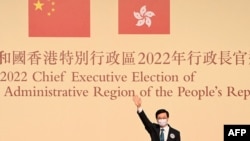ບໍລິສັດປະເທດຕາເວັນຕົກແລະນັກທຸລະກິດທີ່ລ້ຳລວຍດ້ານໜັງສືພິມໃນທ້ອງຖິ່ນ ໄດ້ລົງໂຄສະນາໃນວັນຈັນມື້ນີ້ ສະແດງຄວາມຊົມເຊີຍຕໍ່ທ່ານຈອນ ລີ ທີ່ໄດ້ເປັນຜູ້ນຳຄົນຕໍ່ໄປຂອງຮົງກົງ ຫຼັງຈາກຂັ້ນຕອນການຄັດເລືອກທີ່ໄດ້ຖືກປະນາມໂດຍພວກຕ້ອງຕິວ່າ ເປັນຜູ້ຕໍ່ຕ້ານປະຊາທິປະໄຕ ອີງຕາມລາຍງານຂອງອົງການຂ່າວ AFP ຂອງຝຣັ່ງ
ຈອນ ລີ ອາຍຸ 64 ປີ ອະດີດຫົວໜ້າຮັກສາຄວາມປອດໄພ ທີ່ເປັນຜູ້ກຳກັບນຳການປາບປາມ ຂະບວນການເຄື່ອນໄຫວປະຊາທິປະໄຕໃນຮົງກົງ ໄດ້ຖືກແຕ່ງຕັ້ງໃຫ້ເປັນຜູ້ນຳຄົນໃໝ່ຂອງເຂດທຸລະກິດຮົງກົງ ໃນວັນອາທິດວານນີ້ ໃນການລົງຄະແນນສຽງເກືອບເປັນເອກກະສັນ ໂດຍຄະນະກຳມະການນ້ອຍໆ ທີ່ຈົງຮັກພັກດີຕໍ່ປັກກິ່ງ.
ທ່ານເປັນຜູ້ສະໝັກພຽງຄົນດຽວໃນການແຂ່ງຂັນທີ່ໄດ້ຮັບການໜຸນຫຼັງຈາກປັກກິ່ງ ເພື່ອຮັບໜ້າທີ່ແທນທ່ານນາງແຄຣີ ແລມ ທີ່ເວລາທີ່ຮົງກົງພວມຖືກປັບປ່ຽນໂຄງສ້າງໃໝ່ ໃຫ້ເຂົ້າກັບພາບພົດແບບຜະເດັດການຂອງຈີນ.
ຕາກຸງປາວ (Ta Kung Pao) ແລະເຫວິນເຫວໂປ (Wen Wei Po) ໜັງສືພິມ 2 ສະບັບທີ່ຕອບຮັບຕໍ່ຫ້ອງການກຳນົດນະໂຍບາຍຂອງປັກກິ່ງຢູຮົງກົງ ໃນວັນຈັນມື້ນີ້ ແມ່ນເຕັມດ້ວຍບົດໂຄສະນາຂອງບັນດາບໍລິສັດແລະທຸລະກິດຕ່າງໆທີ່ກ່າວຊົມເຊີຍຕໍ່ການຄັດເລືອກທ່ານຈອນ ລີ.
ສ່ວນໃຫຍ່ແລ້ວ ແມ່ນທຸລະກິດຂອງຈີນ ແລະຮົງກົງ ຕະຫຼອດທັງການຈັດຕັ້ງຂອງປະຊາຄົມຕ່າງໆ.
“4 ບໍລິສັດໃຫຍ່” ດ້ານການບັນຊີ ປະກອບດ້ວຍ KPMG, Deloitte, EY ແລະ PwC ແມ່ນຮວມຢູ່ໃນບັນດາບໍລິສັດຈາກປະເທດຕາເວັນຕົກ ຕະຫຼອດທັງບໍລິສັດຄາເທປາຊີຟິກ (Cathay Pacific) ພ້ອມໆກັນກັບເຄືອບໍລິສັດ Swire ແລະ Jardine Matheson.
ການສະແດງຄວາມດີໃຈຍັງໄດ້ຖືກສົ່ງໄປໂດຍຄອບຄົວຂອງຜູ້ທີ່ລ້ຳລວຍຄອບງຳດ້ານອະສັງຫາລິມມະຊັບຍັກໃຫຍ່ ຮວມທັງຊຸນ ຮຸງ ກາຍ (Sun Hung Kai) ແລະ ບໍລິສັດພັດທະນາທີ່ດິນແຮນເດີສັນ (Henderson.)
ທຸລະກິດຕ່າງໆຂອງປະເທດຕາເວັນຕົກ ໄດ້ພົບຕົນເອງວ່າ ໄດ້ຕົກຢູ່ໃນບ່ອນນັ່ງທີ່ບໍ່ໝັ້ນຄົງຢູ່ໃນຮົງກົງ ໂດຍສະເພາະແລ້ວ ໃນຂະນະທີ່ຄວາມເຄັ່ງຕຶງທາງດ້ານພູມສາດການເມືອງໄດ້ເພີ້ມທະວີຂຶ້ນກັບຈີນ.
ຫຼາຍບໍລິສັດໄດ້ໃຫ້ການສະໜັບສະໜຸນຕໍ່ການເມືອງຫົວກ້າວໜ້າໃນຕະຫຼາດຕາເວັນຕົກ ເຊັ່ນວ່າຂະບວນການຕໍ່ຕ້ານແບ່ງແຍກເຊື້ອເຊີນຜິວພັນ Black Lives Matter ການແຕ່ງງານຂອງຄົນເພດດຽວກັນແລະການກຳຈັດການລະເມີດແຮງງານຢູ່ໃນຕ່ອງໂສ້ອຸບປະທານ.
Hong Kong, China (AFP) — Western multinationals and local tycoons published newspaper adverts on Monday congratulating John Lee on becoming Hong Kong’s next leader, following a rubber-stamp selection process condemned by critics as anti-democratic.
Lee, 64, a former security chief who oversaw the crackdown on Hong Kong’s democracy movement, was anointed the business hub’s new leader on Sunday in a near unanimous vote by a small committee of Beijing loyalists.
He was the sole candidate in the Beijing-backed race to succeed outgoing leader Carrie Lam at a time when Hong Kong is being remoulded in China's authoritarian image.
Ta Kung Pao and Wen Wei Po, two newspapers that answer to the office which sets Beijing’s Hong Kong policy, were filled with adverts on Monday from leading companies and business figures praising Lee's selection.
The majority were from Chinese and Hong Kong businesses as well as community organisations.
The “Big Four” accountancy firms — KPMG, Deloitte, EY and PwC — were among western multinationals placing adverts, as were city carrier Cathay Pacific and conglomerates Swire and Jardine Matheson.
Messages were also carried by Hong Kong’s family tycoon-dominated property giants including Sun Hung Kai and Henderson Land Development.
Western businesses have found themselves in an increasingly precarious position in Hong Kong, especially as geopolitical tensions have risen with China.
Many have embraced progressive political causes in western markets, such as the anti-racism Black Lives Matter movement, same sex equality and ridding supply chains of labour abuses.
But they usually steer clear of any criticism of China’s policies towards hotspots like Hong Kong, Xinjiang, Tibet and Taiwan.
Some companies such as HSBC, Standard Chartered, Swire and Jardine Matheson publicly backed Beijing’s national security law, which was imposed on Hong Kong after 2019's democracy protests to curb dissent.
Despite the city’s mini-constitution promising universal suffrage, Hong Kong has never been a democracy, the source of years of protests since the 1997 handover to China.
After the 2019 rallies Beijing responded with a crackdown and a new “patriots only” political vetting system that eradicated the city's once outspoken political opposition.
Lee faced no rivals and won 99% of the votes cast by the 1,461-strong committee that picks the city’s leader — roughly 0.02% of the city’s population.
Beijing hailed the process as”"a real demonstration of democratic spirit.”
European Union’s foreign policy chief Josep Borrell countered that the selection process was a “violation of democratic principles and political pluralism.”




